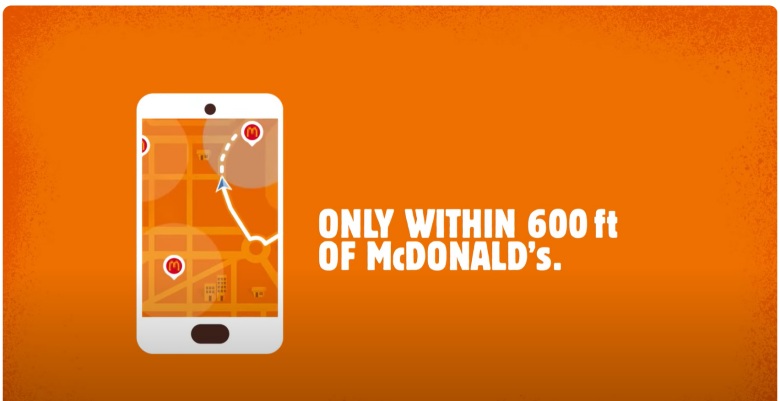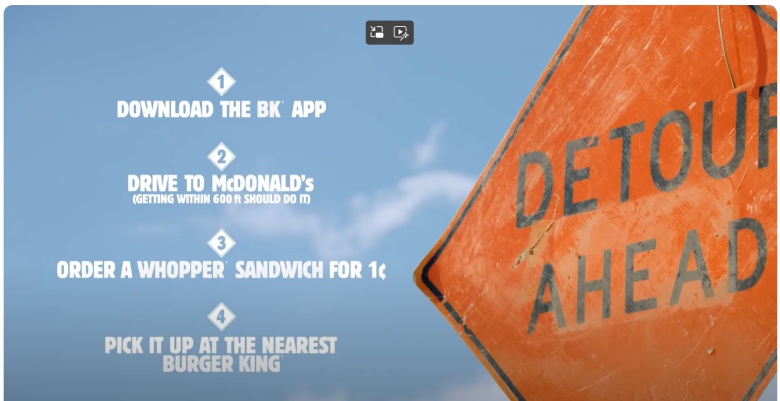
Quick Summary
- Location-based strategy: Burger King used a mobile app to “detour” customers into downloading it and driving near McDonald’s locations for a BK discount.
- Bold rivalry approach: The campaign leveraged Burger King’s iconic rivalry with McDonald’s to grab attention and drive engagement.
- Record-breaking results: The campaign led to high app downloads and increased Burger King sales, showcasing the power of creative digital marketing.
Introduction
In a bold and creative campaign, Burger King took advantage of its longstanding rivalry with McDonald’s to launch the “Whopper Detour.” This clever digital campaign challenged customers to get within 600 feet of any McDonald’s location to unlock a discounted Whopper offer through the Burger King app.
The unconventional approach went viral, driving over a million downloads of the app and cementing the campaign as one of the most creative mobile marketing plays of recent years.
Background
Burger King is known for pushing the envelope with edgy and humorous advertising. The brand often courts younger, digital-savvy audiences by embracing a daring, playful approach, especially in its rivalry with McDonald’s.
With the launch of the “Whopper Detour” campaign, Burger King aimed to grow its digital customer base by incentivizing app downloads while taking a swipe at its largest competitor.
The marketing goal: Use humor and novelty to drive digital engagement and sales by encouraging customers to step outside their usual fast-food routines.
Campaign Overview
The “Whopper Detour” campaign revolved around a simple concept: Get within 600 feet of a McDonald’s location, and Burger King’s app would unlock the option to purchase a Whopper for only a penny.
Burger King used geo-fencing technology to set virtual boundaries around all McDonald’s locations. Once customers were within range, they could then “detour” to the nearest Burger King to pick up their order.
Burger King promoted the campaign through a mix of social media, digital ads, and humorous press releases. By setting the offer to only activate near McDonald’s locations, Burger King tapped into the spirit of fun rivalry that appealed to fast-food fans worldwide.
The deal was available for a limited time, from December 4-12, 2018, which added urgency and motivated customers to act quickly.
Key Success Factors

Geo-targeted advertising and app engagement
The campaign’s core tactic was using geo-fencing to incentivize app downloads and drive foot traffic to Burger King locations. By requiring customers to be close to a McDonald’s, Burger King generated curiosity and interest, encouraging people to download and explore the app.
Engagement through rivalry
Burger King’s playful competition with McDonald’s has been a consistent element in its marketing, but the Whopper Detour took it a step further by directly involving McDonald’s locations.
This aspect immediately generated buzz, as customers loved the playful jab. The rivalry approach resonated well on social media, where fans of both brands engage in debates, reposts, and share the humor with others, amplifying reach organically.
Mobile-first and digital strategy
Burger King smartly capitalized on a growing trend of mobile-first interactions in fast food. Rather than relying on traditional media, they took a fully digital approach, showcasing the app’s capability in a way that seemed fun, easy, and interactive.
Sense of urgency and exclusivity
With just over a week for customers to participate, the campaign created a sense of FOMO (fear of missing out). This urgency, combined with the unique McDonald’s twist, encouraged people to act quickly, creating a feeling of exclusivity and making customers feel part of an inside joke.
Media and social amplification
The humor and originality of the campaign sparked significant media coverage, and social media buzz, as well as word-of-mouth marketing, further amplified its reach.
Innovative Elements

One of the most unique aspects of the Whopper Detour campaign was its use of geo-fencing technology to drive a real-world interaction. Few brands had used geo-targeting on this scale and with such a direct, competitive twist.
The combination of digital and physical location-based interaction provided an engaging experience that aligned perfectly with Burger King’s image as a disruptor in the fast-food space.
What’s more, by directly involving a rival’s locations, Burger King leveraged McDonald’s extensive real estate in a way that amplified Burger King’s brand without traditional advertising costs.
Impact and Results
The “Whopper Detour” campaign delivered remarkable results.
App downloads
During the campaign, Burger King’s app surged to the number one spot on both Google Play and the Apple App Store, with over a million new downloads in just nine days. The campaign ultimately generated 1.5 million app downloads.
Sales boost
The increased app usage and influx of new users contributed to a rise in sales, as customers were encouraged to try new offers and explore Burger King’s digital menu.
Media coverage
Major news outlets and industry publications covered the campaign extensively, estimating hundreds of millions in earned media impressions.
Increased customer engagement
The campaign positioned Burger King as a leader in mobile-driven, experiential marketing, attracting both new and returning customers.
This campaign has become a case study in how brands can use technology to transform the customer experience while keeping their brand voice and values front and center.
Marketer Takeaways
- Leverage competitors for a clever twist: Don’t shy away from engaging with competitors when it’s in good spirit and aligned with your brand voice. Burger King used McDonald’s own presence to create engagement, adding a unique spin that was fun for customers and expanded their reach.
- Use technology to drive real-world behavior: Mobile technology and geo-fencing are powerful tools for creating interactive campaigns that blend the digital and physical worlds. Experimenting with location-based interactions can add a memorable experience to brand interactions.
- Foster a playful brand persona: Humor and rivalry can go a long way in making campaigns relatable. Burger King’s ability to entertain while promoting their product increased brand loyalty and differentiated it from competitors.
- App engagement for customer retention: With the fast-food industry increasingly shifting to mobile ordering, getting customers to download and engage with your app can lead to long-term benefits. Creative, interactive campaigns like the Whopper Detour are effective for app-based engagement and retention.
The “Whopper Detour” campaign shows how combining humor, rivalry, and innovative tech can create a memorable, high-impact brand experience. Marketers can apply these principles to engage customers on a deeper level and drive powerful results.
Media Shower’s AI-powered marketing platform can help detour new customers to your website. Click here for a free trial.